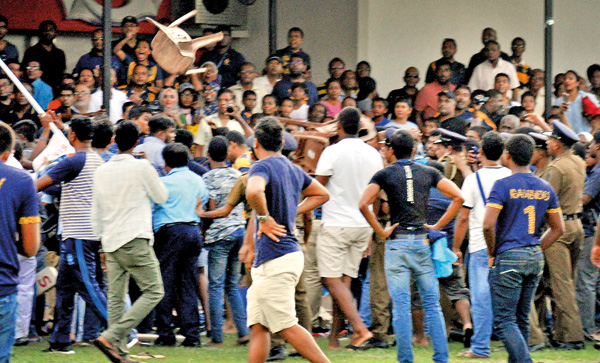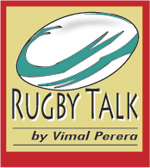To whom it may concern – ‘In the name of God, GO’!
View(s):
No, you are not mistaken, it's indeed a rugby game - File pic
 Addressing the Government’s front Bench in 1971, in the wake of the ‘April Insurrection’, with only a handful of MPs on his side, Leader of the Opposition, J.R. Jayewardene echoed Cromwell’s famous exhortation; “In the name of God, go!”. Today, in 2019, when the UNP, the government is led by Prime Minister Ranil Wickremesinghe, nephew of JRJ, have we got to repeat the words of his illustrious uncle to some of those in Rugby.
Addressing the Government’s front Bench in 1971, in the wake of the ‘April Insurrection’, with only a handful of MPs on his side, Leader of the Opposition, J.R. Jayewardene echoed Cromwell’s famous exhortation; “In the name of God, go!”. Today, in 2019, when the UNP, the government is led by Prime Minister Ranil Wickremesinghe, nephew of JRJ, have we got to repeat the words of his illustrious uncle to some of those in Rugby.
The remark, “See you in courts” is not strange to Rugby. To threaten court action is a fashion, even if it be an attempt to teach English from the formative stage. People ask for a writ, not realising it will drag on for years. The Appeal Court, on March 6, dismissed with costs, a writ application of Brian Peter Obeysekera against the Sri Lanka Schools Rugby Football Association (SLSRFA). The judgment was based on very fundamental aspects of Law and is of importance for the future of Rugby and, for that matter, for any Sport in Sri Lanka. The petitioner filed his application in 2015, seeking a mandate in the nature of a writ of certiorari, to quash a decision of the SLSRFA.
The learned judge observed, “It is common ground that writ jurisdiction of this Court cannot be invoked as of right. It is a discretionary relief. In that regard, the conduct of the party applying for writ is intensely relevant. The petitioner may be completely innocent, but he cannot keep it to himself and decide his own case. There is a complainant (the Referee) and a complaint. He knew it at least after the first date of the inquiry to which the representatives of his school participated. But he did not want to intervene and vindicate his name. He will have to blame himself for it. After he was informed of the punishment—a ban for two matches—he says he complied. At least, at that time, no attempt has been made seeking an opportunity to place facts before the Association.”
The judgment, though not vindicating the action of the SLSRFA, does give a message that there is a protocol named the “tournament manual”. Neither does it say that abusing the Referee is wrong, but a simple fundamental process of the Law has not been followed.
It is now more important for tournament organisers, as well of match officials, to ensure governance on their part. The fact that the Referee is the sole judge of fact and Law, must be accepted through the display of competence and the acceptance of a fair call. It is like the case of “Madush”: If you were known to have associated with him, then you are under suspicion.
When player safety is important, the Schools section seems to have abdicated to the host team to provide a match doctor. The match doctor walks in just prior to the main match, while Junior matches, at times, are played sans the qualified medical personnel. World Rugby has guidelines and a process for qualifying medical personnel. On site may be doctors who know medicine, but are unaware of the requirements of the game of Rugby. Recently, I saw a player, sent out for a head injury, returning to play after a time off the field. If any player is concussed or, has suspected concussion, that player must immediately and permanently be removed from the playing area. Head Injury Assessment and return is only for elite Rugby and approved by World Rugby. In this instance, it appeared that the doctor, coach nor Referee adhered to the requirements.
A few years ago, there were less guidelines for a Rugby certified match doctor, and all that was done was to have a doctor on the field. There was an instance in and around the mid ’90s that the doctor introduced to the Referee was a veterinary surgeon. Those were the times, veterinary, dental, hospital attendants etc were brought in covered under the cloak of “medically trained”.
Another issue is the absence of citing officers in school matches. There were dangerous tackles that should have seen a double ‘Red’. A player was taken while in the air and the tackler had no intention of challenging the ball, but went into the man in the air without an arm round. Got to start with reckless and add the other ingredients. The referee did not see the incident neither did the AR. Then there was the case of a tip tackle. Where the process should be was the tackled player static, was he lifted from below the waist, was he lifted, turned beyond the horizontal, or was he dropped or driven to ground. Start from the high end of Red.
As there was no citing the player lives to play after 10 minutes of a Yellow. The offenders might be good players but, when he gets away with this type dangerous play, the future holds more horrors. Citing could be done even by a Match Commissioner, but the question is whether they are trained to be able.
The ingenuity of coaches is such that you see a blatant obstruction by many teams but are not picked up by the Referees. The modus operandi is to stand behind the offside line at breakdown, including a ruck and maul. They stand in parallel to the offside line and spread when it is your ball. When the ball is passed from the base the defenders have no way to get to the ball or player as there is almost a wall in front. To solve these there need to be a dialog, not monotonous thinking.
For better refereeing, it is always important to build a relationship with officials and players. The problem that stands in the way is that coaches want to show off their knowledge and match officials too want to show off theirs. There is little education when coaches talk to players or referees, or when referees talk to coaches or players. The perception of “I am the boss” prevails.
Why the relationship cannot be built has been best evidenced by the performance of 3 Sri Lankan Referees sent for a higher level Referee’s Course. None completed it. Is it an indication of damnation? Not of the referee, but those who hold office. Paid full-timers should have guided the referees before they departed on the two leg process. To develop an action plan as required, is not rocket science, but when you go with an attitude of shoving the blame on others, it is not a self review. Which is a judgment made by an individual about their abilities, or the process of doing something: This offers you the opportunity to do a self evaluation, a highly valuable tool for professional development?
The inability lies in the cornering of some so that, the Peter Principle of man rising to his level of inefficiency prevails. Unfortunately, the vultures flaunt that they have the backing of the powers that be. It reminds me of a story when the principle of SMART, as in planning, was discussed. A prominent lead in the current situation explained SMART as ironing the kit, polishing the boots, walking tall etc. No wonder we have to echo the words of Cromwell repeated by JRJ.
Vimal Perera is a former Rugby Referee, Coach and an Accredited Referees’ Evaluator IRB


